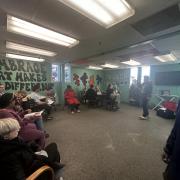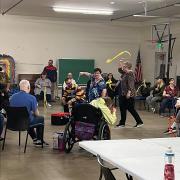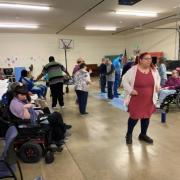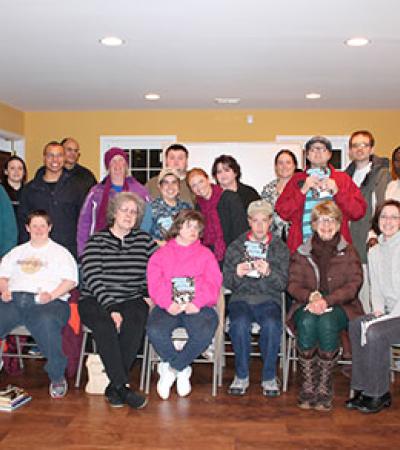Library Time is a modified storytime for adults with intellectual disabilities, offered to several local facilities serving adults with intellectual disabilities. Its focus is literacy, music and movement. We have a fabulous time reading books and singing and dancing along to our favorite songs.
Advanced Planning
The goal of this program was to take literacy and music/movement programming to local facilities serving adults with intellectual disabilities. It was simple to plan. I consulted with high school teachers to find out where students with disabilities were going after graduation. I then contacted these facilities and offered to make regular visits.
Marketing
Marketing was not a factor for this program, as it is a collaborative program with local agencies. After our first collaboration, the word spread and other agencies asked for library staff to visit.
Budgeting
The items recommended are things most libraries already own: iPad or iPod, speakers, portable voice amplifier, stuffed animals, books, manipulatives (rhythm sticks, egg shakers, ribbons, beanbags, parachute). Ongoing expenses include staff time and costs for photocopies.
Day-of-event Activity
I travel to the facilities and set up my workspace myself. This requires only one staff member, although it would be great to have two.
Program Execution
I have been visiting one facility every Monday for seven years. The program lasts for 45 minutes. I start with a few songs we sing along with or move to; if I hand out lyrics, this adds a literacy element. The middle segment is the literacy portion. I typically read a picture book to the group, but sometimes we do a readers’ theater or read poems together. The third segment is more movement and music. I play a few songs while we use “manipulatives” – rhythm sticks, ribbons, etc.
I always bring puppets and stuffed animals. They create engagement for some of the participants who are more reluctant to – or are unable to – participate themselves. It’s important to do self-evaluations and tailor the books and songs to the abilities and interests of your particular group.
This program has created a strong bond between the library and the community agency. I deliver library books to them once a month and I give them discarded library books. I started a successful book club at the facility and brought summer learning program materials so that the members could participate and earn developmentally appropriate books.
Advice
If you’re new to programming with adults with intellectual disabilities, do some research on disability etiquette. A good place to start is the book "Demystifying Disability" by Emily Ladau.
Ask local teachers or search online to find area facilities serving adults with intellectual disabilities. Reach out and ask if they are interested in a visit from a library staff member sharing literacy and music/movement. You can even offer to visit just once and then propose regular visits after they see how much the participants enjoy it.
Ask for general guidelines on the participants’ interests and comprehension levels to help choose appropriate books and songs. If you can swing it, visit the facility weekly; that allows for greater continuity and deeper bonds between library staff and the participants.






